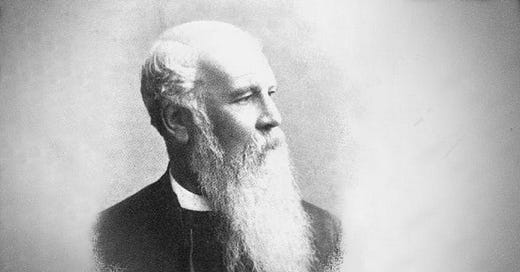I’ve been reading JC Ryle’s Expository Thoughts on the Gospels (Matthew) and his thoughts below were in light of reading Matthew 4:17. In this blog I am going to interact with several of his quotes in relation to this verse and the topic of repentance.
“The necessity of repentance is one of the great foundations which lie at the very root of Christianity.”
The Greek word for repentance is metánoia, which means to literally “change one’s mind.” In Hebrew (שׁוּב) the word “means ‘to turn back’ or ‘to return,’ indicating a return to God and His ways.”1 Repentance is foundational to Christianity because it resides at the heart of what it means to be transformed. Transformation—conversion, in other words—cannot truly take place without repentance.
Repentance is not about perfection, but a new direction. It is for the whole life, as Martin Luther wrote in his first thesis: “When our Lord and Master Jesus Christ said ‘Repent,’ he intended that the entire life of believers should be repentance.” Repentance is certainly a one-time, monumental event at conversion, but it’s also a continual, daily process for the Christian. We continue to repent everyday because there’s more sin to repent of. We fight to shed off old, sinful flesh everyday by God’s grace.
“It needs to be impressed on all people without exception, high or low, rich or poor; all have sinned and are guilt before God and all must repent and be converted if they would be saved.”
No one is exempt from the need for repentance. It doesn’t matter who you are, who you know, how much money is in your bank account, where you live—all people need to repent because all people have sinned (Romans 3:23). No one is blameless; everyone needs Jesus.
I love that Ryle says, “It needs to be impressed on all people…” In other words, don’t be afraid to call people to repentance (and faith)! They need to repent; it’s a requirement. We must certainly call people to repentance with grace and compassion; but need we never be ashamed for doing so in the first place, as that is what our Lord did.
“And true repentance is no light matter. It is a thorough change of heart about sin, a change showing itself in godly sorrow and humiliation, in heartfelt confession before the throne of grace, in a complete breaking off from sinful habits and an abiding hatred of all sin. Such repentance is the inseparable companion of saving faith in Christ.”
Ryle mentioned true repentance, because false repentance does exist. It makes me think of my daughter. She is almost six years old and has been struggling with temper tantrums (don’t they all?). She always does a good job of apologizing unprompted. But then her little sister might do something that sets her off 30 minutes later and she’s back to throwing a fit.
I’ve explained to her that although I think it’s great that she apologizes, her saying “sorry” doesn’t mean much when she does the same thing she just apologized for 30 minutes later. I certainly don’t know her heart, but perhaps that’s a classic case of false repentance, and it’s something we Christian must watch out for. Why are we really apologizing? Is it because we got caught, or the repercussions, or are we truly sorrowful that we offended our holy God?
Ryle mentions a “complete breaking off from sinful habits and an abiding hatred of sin.” We all should know that the Christian life is filled with ups and downs, ebbs and flows, mountaintops and valleys. But through it all we must have a different stance against sinful habits and a hatred of our indwelling sin. No, we will not be perfect; hence our daily repentance. But breaking off from sinful habits and abhorring our sin is one of the aspects of true, godly repentance, along with godly sorrow.
“Let us prize the doctrine highly—it is of highest importance. No Christian teaching can be called sound, which does not constantly bring forward “repentance toward God and faith in our Lord Jesus Christ” (Acts 20:21).
If a teacher is a proclaiming a gospel void of repentance, then he or she is not proclaiming the biblical gospel. A repentance-free gospel sends many a soul to Hell. This is why people flock in droves to preaches and messages that don’t contain repentance. If there’s no call to repentance, there’s no concern about changing our minds or lives. There’s no call to transformation. These self-help messages might get you to change habits, for example, but they don’t get to the heart of the issue.
We must repent of our sin. We must make an about-turn from our sin and to God. It is crucial for us to follow teachings that preach the full counsel of God, which includes the necessity of Spirit-wrought repentance and faith.
Pulled from https://biblehub.com/greek/3341.htm.




